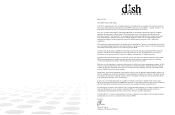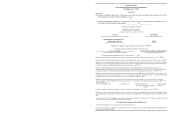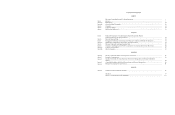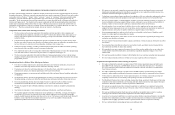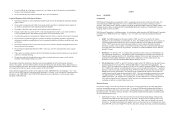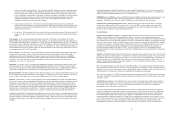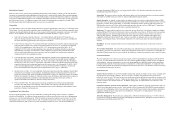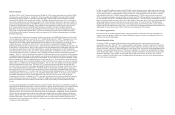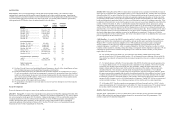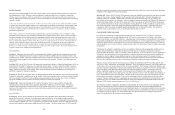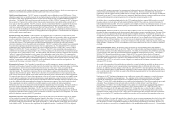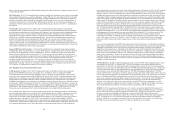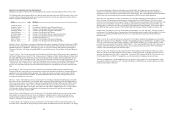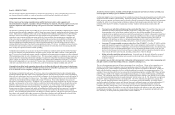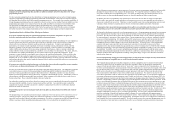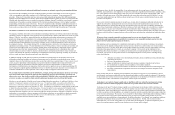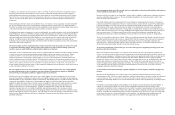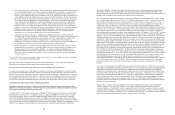Dish Network 2012 Annual Report Download - page 12
Download and view the complete annual report
Please find page 12 of the 2012 Dish Network annual report below. You can navigate through the pages in the report by either clicking on the pages listed below, or by using the keyword search tool below to find specific information within the annual report.12
12
FCC Regulations Governing our DBS Operations
FCC Jurisdiction over our DBS Satellite Operations. The Communications Act gives the FCC broad authority to
regulate the operations of satellite companies. Specifically, the Communications Act gives the FCC regulatory
jurisdiction over the following areas relating to communications satellite operations:
x the assignment of satellite radio frequencies and orbital locations, the licensing of satellites and
earth stations, the granting of related authorizations, and evaluation of the fitness of a company to
be a licensee;
x approval for the relocation of satellites to different orbital locations or the replacement of an
existing satellite with a new satellite;
x ensuring compliance with the terms and conditions of such assignments, licenses, authorizations
and approvals; including required timetables for construction and operation of satellites;
x avoiding interference with other radio frequency emitters; and
x ensuring compliance with other applicable provisions of the Communications Act and FCC rules
and regulations.
To obtain FCC satellite licenses and authorizations, satellite operators must satisfy strict legal, technical and
financial qualification requirements. Once issued, these licenses and authorizations are subject to a number of
conditions including, among other things, satisfaction of ongoing due diligence obligations, construction milestones,
and various reporting requirements. Necessary federal approval of these applications may not be granted, may not
be granted in a timely manner, or may be granted subject to conditions which may be cumbersome.
Overview of our DBS Satellites, Authorizations and Contractual Rights for Satellite Capacity. Our satellites are
located in orbital positions, or slots, that are designated by their western longitude. An orbital position describes
both a physical location and an assignment of spectrum in the applicable frequency band. Each DBS orbital position
has 500 MHz of available Ku-band spectrum that is divided into 32 frequency channels. Through digital
compression technology, we can currently transmit between nine and 13 standard definition digital video channels
per DBS frequency channel. Several of our satellites also include spot-beam technology that enables us to increase
the number of markets where we provide local channels, but reduces the number of video channels that could
otherwise be offered across the entire United States.
The FCC has licensed us to operate a total of 50 DBS frequency channels at the following orbital locations:
x 21 DBS frequency channels at the 119 degree orbital location, capable of providing service to
CONUS;
x 29 DBS frequency channels at the 110 degree orbital location, capable of providing service to
CONUS; and
We previously held a license for 32 DBS frequency channels at the 148 degree orbital location, capable of providing
service to the Western United States. On May 31, 2012, the FCC’s International Bureau announced the termination
of this license. We had not had a satellite positioned at the 148 degree orbital location since the retirement of
EchoStar V in August 2009.
In addition, we currently lease or have entered into agreements to lease capacity on satellites using the following
spectrum at the following orbital locations:
x 500 MHz of Ku-band FSS spectrum that is divided into 32 frequency channels at the 118.7 degree
orbital location, which is a Canadian FSS slot that is capable of providing service to the
continental United States, Alaska and Hawaii;
x 32 DBS frequency channels at the 129 degree orbital location, which is a Canadian DBS slot that
is capable of providing service to most of the United States;
x 32 DBS frequency channels at the 61.5 degree orbital location, capable of providing service to
most of the United States;
13
13
x 24 DBS frequency channels at the 77 degree orbital location, which is a Mexican DBS slot that is
capable of providing service to most of the United States and Mexico; and
x 32 DBS frequency channels at the 72.7 degree orbital location, which is a Canadian DBS slot that
is capable of providing service to the United States.
We also have month-to-month FSS capacity available from EchoStar on a satellite located at the 121 degree orbital
location.
Duration of our DBS Satellite Licenses. Generally speaking, all of our satellite licenses are subject to expiration
unless renewed by the FCC. The term of each of our DBS licenses is ten years. Our licenses are currently set to
expire at various times. In addition, at various times we have relied on special temporary authorizations for our
operations. A special temporary authorization is granted for a period of only 180 days or less, subject again to
possible renewal by the FCC. Generally, our FCC licenses and special temporary authorizations have been renewed
by the FCC on a routine basis, but there can be no assurance that the FCC will continue to do so.
Opposition and Other Risks to our Licenses. Several third parties have opposed, and we expect them to continue to
oppose, some of our FCC satellite authorizations and pending and future requests to the FCC for extensions,
modifications, waivers and approvals of our licenses. In addition, we must comply with numerous FCC reporting,
filing and other requirements in connection with our satellite authorizations. Consequently, it is possible the FCC
could revoke, terminate, condition or decline to extend or renew certain of our authorizations or licenses.
4.5 Degree Spacing Tweener Satellites. The FCC has proposed to allow so-called “tweener” DBS operations –
DBS satellites operating at orbital locations 4.5 degrees (half of the usual nine degrees) away from other DBS
satellites. The FCC granted authorizations to Spectrum Five and EchoStar for tweener satellites at the 86.5 and
114.5 degree orbital locations. Even though these authorizations were subsequently cancelled because the FCC
determined that the licensees did not meet certain milestone requirements, Spectrum Five and EchoStar have
requested reconsideration of the FCC’s determinations for both of these licensees. Tweener operations close to our
licensed orbital locations (including Spectrum Five’s proposed use at the 114.5 degree orbital location) could cause
harmful interference to our service and constrain our future operations. The FCC has not completed its rulemaking
on the operating and service rules for tweener satellites.
Interference from Other Services Sharing Satellite Spectrum. The FCC has adopted rules that allow non-
geostationary orbit fixed satellite services to operate on a co-primary basis in the same frequency band as DBS and
FSS. The FCC has also authorized the use of multichannel video distribution & data service (“MVDDS”) licenses
in the DBS band. MVDDS licenses were auctioned in 2004. MVDDS systems are now only beginning to be
commercially deployed in a few markets. We have MVDDS licenses in 82 out of 214 geographical license areas.
Despite regulatory provisions intended to protect DBS and FSS operations from harmful interference, there can be
no assurance that operations by other satellites or terrestrial communication services in the DBS and FSS bands will
not interfere with our DBS and FSS operations and adversely affect our business.
International Satellite Competition and Interference. DirecTV has obtained FCC authority to provide service to
the United States from a Canadian DBS orbital slot, and EchoStar has obtained authority to provide service to the
United States from both a Mexican and a Canadian DBS orbital slot. Further, we have also received authority to do
the same from a Canadian DBS orbital slot at 129 degrees and a Canadian FSS orbital slot at 118.7 degrees. The
possibility that the FCC will allow service to the U.S. from additional foreign slots may permit additional
competition against us from other satellite providers. It may also provide a means by which to increase our
available satellite capacity in the United States. In addition, a number of administrations, such as Great Britain and
the Netherlands, have requested to add orbital locations serving the U.S. close to our licensed slots. Such operations
could cause harmful interference to our satellites and constrain our future operations.
Rules Relating to Broadcast Services. The FCC imposes different rules for “subscription” and “broadcast”
services. We believe that because we offer a subscription programming service, we are not subject to many of the
regulatory obligations imposed upon broadcast licensees. However, we cannot be certain whether the FCC will find
in the future that we must comply with regulatory obligations as a broadcast licensee, and certain parties have
requested that we be treated as a broadcaster. If the FCC determines that we are a broadcast licensee, it could


